Brandon Teal, a UNC Health Alliance community health worker, shares his experience contributing to UNC Health’s equitable vaccine distribution mission.
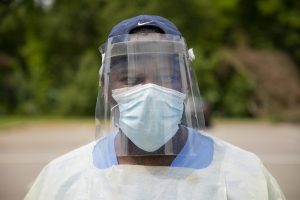
It’s Wednesday around 6 a.m. as Brandon Teal readies himself for a busy day with the UNC Health COVID-19 Vaccination Mobile Clinic. He walks his dog Mr. Bentley, grabs some food and then his keys, and drives to the UNC Rex Lake Boone Trail site where the Mobile Unit van is parked for the day.
Due to the pandemic, his job shifted but the focus remained the same: bringing healthcare directly to individuals.
“Before COVID hit, I was doing home visits,” said Teal, 31. “I started a program called Chronic Condition Management where I would initiate home visits to patients suffering from conditions like diabetes or hypertension. It was an 8-week course where I would go over tasks and tools that the patient needed to reach their healthcare goals.”
“I’ve always had a passion for serving the community and helping others receive access,” said Teal, who’s been a community health worker with UNC Health since 2019 and has supported UNC Health’s COVID response efforts since the early days of the pandemic.
As a patient advocate, Teal supported those who need ongoing help with adopting health behaviors and connecting to resources in their communities. Little did he know this type of experience would lead him to directly serve the community during a global pandemic.
Bridging the gap between patients and vaccines
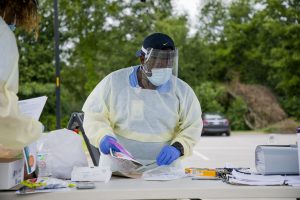 The home visits decreased a lot during the early months of the pandemic, but the core of Teal’s job never changed – improving patient wellness.
The home visits decreased a lot during the early months of the pandemic, but the core of Teal’s job never changed – improving patient wellness.
UNC Health launched its mobile vaccination clinic to help reduce racial and ethnic disparities by traveling to rural, underserved populations to provide COVID vaccinations. As a member of the unit, Brandon collaborates with non-healthcare partners such as churches, schools, and nonprofits to select mobile clinic locations and sign people up for vaccine appointments.
“We really like working with our community partners because they know the people in the community,” Teal said. “They know what the needs and wants are for their specific population.”
From planning to logistics, Mondays and Tuesdays are typically the days where the groundwork for a designated site begins.
“I usually spend the first two days of the week focusing on locations, site visits, and scheduling,” he said. “Once that’s completed, I’ll visit the site to make sure it is conducive to host the unit – to make sure there’s enough space for parking and social distancing. We have safety measures we have to follow as well.”
Throughout the pandemic it became clear traditionally marginalized populations – African American/Black and LatinX – were more likely to contract COVID-19 , as well as experience more severe symptoms. To help improve access to COVID-19 vaccines through connecting with groups such as Howell’s Chapel Church of Christ in Selma, the Bahama Ruritan Club, Dorcas Ministries in Cary, Durham Technical Community College, and multiple other sites, the mobile unit increased its vaccine appointments. Since April, more than 1,000 individuals have been vaccinated through the COVID mobile unit.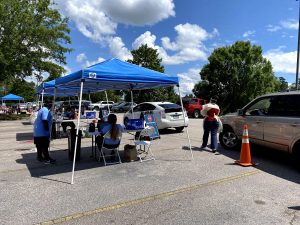
“My job is very fulfilling because I enjoy serving my community,” Teal said. “Being a man of color, I’m excited that I can provide resources to these underserved populations.”
“Where you are financially determines how you get access. Just because you don’t have the education or income, doesn’t mean you should be left out. I take pride in serving those who need it most. We want to be right in their backyards to make these resources accessible to them. Everybody has a different situation and we are here to accommodate what people need,” said Teal.
One Team, One Mobile Van
Thursday is another day, and Teal heads to Durham Tech, where the team consisting of a site supervisor, community health manager, two community health workers, nurse practitioners, and a medical office assistant huddle to discuss logistics. It takes 45 minutes to setup the mobile vaccine clinic, and all equipment is packed inside a four-door van, which Teal said is the unit’s lifeline.
“Inside the van we have about 10 tables, 35 chairs, five tents, and administrative materials,” said Teal. “It’s all hands on deck when it’s time to setup. I do not help prepare the vaccines because I’m not clinical, but I fulfill a job duty where it’s needed. I’ve done charting for the nurses, help greet patients, and traffic control for parking. I’ve done it all.”
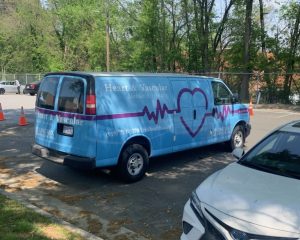 This is the same van UNC Health used for COVID testing and support services for underrepresented communities throughout 2020. With the same goal of reaching those populations, the mobile unit had a two-week turnaround time to switch from mobile testing to vaccinations in February 2021.
This is the same van UNC Health used for COVID testing and support services for underrepresented communities throughout 2020. With the same goal of reaching those populations, the mobile unit had a two-week turnaround time to switch from mobile testing to vaccinations in February 2021.
“We had to come up with a whole new plan of logistics and we kicked off our first mobile vaccination clinic in Johnston County in February. After completing first and second doses for those patients, we traveled to Durham County to begin new vaccination appointments,” said Teal.
It’s 9:30 a.m. as team members log into the electronic scheduling system. Vaccinations begin at 10.
“Our clinic is setup with a few nurses stations where patients can check in to receive the vaccination,” Teal said. “Once the patient gets their shot, they go to the observation area to be observed for 15 to 30 minutes in case of adverse reactions. Once the time is up, the patient checks in with the medical office assistant to schedule their second inoculation.”
The Pfizer/BioNtech and Moderna vaccines require two inoculations. To make sure patients are receiving their 2nd dose, the mobile unit comes back to the same location in three or four weeks to serve those specific patients. Vaccinations take place Wednesdays through Fridays every week. Depending on the needs of the community, the mobile unit can be seen working a Saturday, too. All appointments are scheduled as first come, first served, and the unit aims to provide 100 doses per day.
Improving health equity for all
COVID-19 and a reckoning with racial health disparities and inequities has been an uphill battle for healthcare workers, especially when trying to identify and enroll target populations. To maximize patient recruitment, Teal remains steadfast in sharing valuable vaccine facts and information with community partners in hopes that these communities take precautions in protecting themselves and their families.
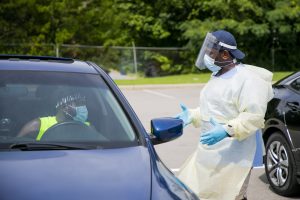 “I understand the fear of trying something new, something different, but we’ve done a magnificent job researching this virus and developing vaccines to fight against it. And, there’s substantial information out there regarding its safety and effectiveness,” said Teal. “People should not be worried. We know what happened in the past, but now we’re in a new era. We have Black and Brown medical experts in the field. We have medical advances. Things have changed. I try my hardest to explain this whenever I can.”
“I understand the fear of trying something new, something different, but we’ve done a magnificent job researching this virus and developing vaccines to fight against it. And, there’s substantial information out there regarding its safety and effectiveness,” said Teal. “People should not be worried. We know what happened in the past, but now we’re in a new era. We have Black and Brown medical experts in the field. We have medical advances. Things have changed. I try my hardest to explain this whenever I can.”
Vaccinations start to wrap up at 4:30 p.m. Once the last patient leaves, the team begins to break down equipment and sanitize tables and chairs. Teal arrives home around 5:30 p.m. and Mr. Bentley greets him at the door. The day is drawing to a close, but for Brandon and his team, they are one step closer to winning the war against COVID-19.
“We are in those housing communities, trailer parks, church parking lots and we’re seeing these populations. It’s truly transformative work,” Teal said. “I want to help build that trust in the healthcare system. I want to see us get back to a since of normalcy. I want all communities, no matter who you are or what color you are, to fight this virus and survive. I’m glad we’re taking steps in the right direction.”
Written by Brittany Phillips, UNC Health Communications Specialist